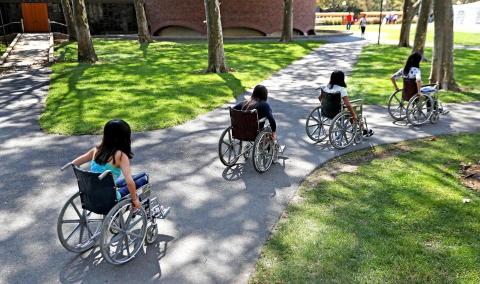
Able-bodied MIT students used wheelchairs to get around the Cambridge campus last week. Photo by David L. Ryan/Boston Globe.
Once a year for two hours, a group of able-bodied students at the Massachusetts Institute of Technology takes to the streets of Cambridge and their campus halls in wheelchairs.
During another two-hour class period, they walk around the classroom wearing goggles wrapped in duct tape and plastic wrap to simulate different levels of visual impairment.
That’s because they’re enrolled in HST 420/6.811/2.78 Principles and Practice of Assistive Technology (PPAT), a course* offered every fall that gives students the chance to put themselves in the shoes of people with disabilities for a brief amount of time.
The students might be able to build roller coasters on campus and waterfalls in their fraternity houses, but when it comes to using a wheelchair or navigating hallways with impaired vision, most of them don’t know where to begin, said senior lecturer Julie Greenberg.
Greenberg, who teaches the course, said for the first two weeks, students participate in labs simulating various physical disabilities in order to better understand the needs of those who use assistive technology.
“They’re very familiar with the MIT campus, so they’re engaging in familiar activities from an entirely new perspective,” Greenberg said. “The course is designed so that for the first couple of weeks, the students are getting this . . . perspective.”
Greenberg said when she sends her students off in wheelchairs, she asks them to perform seemingly simple tasks around campus: using water fountains, sending e-mails from library computers, using public restrooms, crossing the street.
“Whenever possible, we want them to do that from the perspective of the person using the technology,” Greenberg said.
Students return to class sweaty and surprised, with aching arms and blistered hands.
*The Principles and Practice of Assistive Technology class was founded by Professor Seth Teller, who first offered it in 2011. The class is currently co-taught by Rob Miller (EECS), John Leonard (MechE), and Julie Greenberg (IMES/HST).
https://www.bostonglobe.com/metro/2017/09/17/mit-class-focuses-life-lived-wheels/09j1DM8O1j8MxtBLcl0IZP/story.html